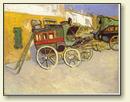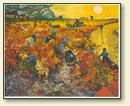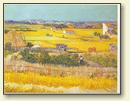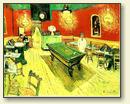| Relevant paintings: 
"Pieta (after Delacroix)," Vincent van Gogh
[Enlarge]

"Pieta (after Delacroix)," Vincent van Gogh
[Enlarge]

"Portrait of Trabuc, an Attendant at Saint-Paul Hospital," Vincent van Gogh
[Enlarge]

"Christ on the Sea of Galilee," Delacroix
[Enlarge]

"La Berceuse (Augustine Roulin)," Vincent van Gogh
[Enlarge]

"Tarascon Diligence," Vincent van Gogh
[Enlarge]

"The Red Vineyard," Vincent van Gogh
[Enlarge]

"Harvest at La Crau, with Montmajour in the Background," Vincent van Gogh
[Enlarge]

"Night Cafe on Place Lamartine in Arles," Vincent van Gogh
[Enlarge]
|
Highlighting art - supplies - Turn off highlighting
My dear Theo,
I think what you say in your letter is quite right, that
Rousseau and artists such as Bodmer are in any case men,
and that one would want the world to be peopled with men like
them - indeed, yes, that's how I feel as well.
And that J. H. Weissenbruch knows & does the muddy
towpaths, the stunted willows, the foreshortenings & the
skilful & strange perspectives of the canals, as Daumier
does the lawyers, I think that's perfect. Tersteeg has done
well to buy some of his work. The reason people like that don't
sell is, I think, because there are too many dealers trying to
sell other things with which they deceive & mislead the
public.
Do you know that even today, when I chance upon the story of
some energetic industrialist, or even more of some publisher, I
still feel the same indignation, the same rage as I used to
when I was with G. & Cie.
Especially in my case, where a more violent attack could
destroy my ability to paint for good.
My dear brother, you know that I came to the south and threw
myself into work for a thousand reasons - looking for a
different light, believing that observing nature under a
brighter sky might give one a more accurate idea of the way the
Japanese feel and draw. Wanting, finally, to see this stronger
sun, because one has the feeling that unless one knows it one
would not be able to understand the pictures of Delacroix, as
far as execution and technique are concerned, and because one
feels that the colours of the prism are veiled in the mists of
the north.
All this remains more or less true. Then if one adds that
heartfelt leaning towards the south Daudet described in
Tartarin, and the fact that from time to time I have also found
friends and things to love here, then you will understand that
however horrible I find my illness, I have the feeling that I
have formed ties here that are a little too strong - ties which
could later make me long to come back and work here again.
Despite all this it could be that I shall be returning to the
north fairly soon.
Yes, for I shall not conceal from you that in the same way
that I am at present eating ravenously, so I have a terrible
craving to see my friends again and the countryside of the
north.
Work is going very well, I am discovering things I have
sought in vain for years, and, aware of that, I am constantly
reminded of that saying of Delacroix's you know, that he
discovered painting when he had neither breath nor teeth left.
Oh well, with my mental illness, I think of so many other
artists suffering mentally, and tell myself that it doesn't
stop one from carrying on one's trade as painter as if nothing
had gone wrong.
I was very sad about it - so I have been busy painting it
and you will see it one day on a size 5 or 6 canvas. I have made a copy of it
which I think has some feeling. Besides, having seen Daniel and Les
Odalisques and the portrait of Bruyas and La
mulâtresse in Montpellier not long ago, I am still
under the impression they made on me.
That is what uplifts me, and also reading a fine book such
as one by Beecher Stowe or by Dickens. But what disturbs me is
the constant sight of these good women, who both believe in the
Virgin of Lourdes and make up that sort of thing, and realizing
that one is a prisoner of an administration that is only too
willing to cultivate these unhealthy religious aberrations when
it should be concerned with curing them. So I say again, better
to go, if not into penal servitude, at least into the army.
I reproach myself with my cowardice, I ought to have
defended my studio better, even if it meant coming to blows
with the gendarmes & the neighbours. Others would have used
a revolver in my place, and had one killed gawking idiots like
that, as an artist one would certainly have been acquitted. It
would have been better had I done that, but I was cowardly and
drunk - ill too, but I wasn't brave.
I'm also very frightened in the face of the suffering
brought on by these attacks, and so I don't know if my zeal is
anything other than what I said, it is like that of someone who
means to commit suicide, but then struggles for the shore
because he finds the water too cold.
But listen, to be in board and lodgings as Braat was when I
saw him that time - happily long ago - no, and no again.
It would be different if old Pissarro or Vignon, for
instance, would care to take me in. Well, I'm a painter myself
- it could be arranged, and it would be better if the money
went to feed painters than to the excellent nuns.
Yesterday I asked M. Peyron point-blank, since you are going
to Paris, what would you say if I suggested that you be kind
enough to take me with you? His reply was evasive - that it was
too sudden, that he would have to write to you beforehand.
But he is very kind and very indulgent towards me, and while
he doesn't have the final say here, far from it, I have him to
thank for many liberties.
After all, one shouldn't only make pictures, one should see
people too, and every now and then, by associating with others,
recuperate a little and stock up on new ideas.
I've abandoned any hope that it won't come back - on the
contrary, we must face the fact that I will have an attack from
time to time. But at those times I could go into an asylum or
even into the town prison where they usually have an isolation
cell.
Don't be anxious, in any case - the work is going well, and
look, I don't need to tell you that I've still got a lot of
things to do, wheat fields, &c.
I've done the portrait of the attendant [Lost painting] and
have got a copy of it for you. It makes a
fairly curious contrast with the portrait I've done of myself,
in which the look is vague and veiled, whereas he has a
military air and small, lively, black eyes.
I have given it to him, and I'll do his wife as well, if she
wants to pose. She is a woman whose looks have faded, a poor
soul, resigned to her fate, nothing out of the ordinary and so
insignificant that I simply long to paint that dusty blade of
grass. I talked to her sometimes when I was doing some olive
trees behind their little house, and she told me then that she
didn't believe I was ill - in fact, you would now say the same
if you saw me working, my mind clear and my fingers so sure
that I drew that Pietà by Delacroix without taking
a single measurement, though there are those four hands and
arms in the foreground - gestures and postures that are not
exactly easy or simple.
Please send me the canvas soon, if at all possible,
and I think I'm also going to need 10 more tubes of zinc
white.
All the same, I'm sure that if one is brave then recovery
comes from within, through the complete acceptance of suffering
and death, and through the surrender of one's will and love of
self. But that's no good to me, I like to paint, to see people
and things and everything that makes our life - artificial, if
you like. Yes, real life would be something else, but I don't
think I belong to that category of souls who are ready to live,
and also ready to suffer, at any moment.
In the open air, exposed to the wind, to the sun, to
people's curiosity, one works as best one can, one fills one's
canvas regardless. Yet that is how one captures the true and
the essential - the most difficult part. But when, after some
time, one resumes the study and alters the brushstrokes in
keeping with the objects - the result is without doubt more
harmonious and pleasant to look at, and one can add whatever
serenity and happiness one feels.
Ah, I shall never be able to convey my impressions of some
of the figures I have seen here. Certainly, this is the new
road, this road to the south, but men from the north find it
difficult to follow. And I can already see myself one day in
the future enjoying some small success, and missing the
solitude and the anguish as I watched the reaper in the field
below through the iron bars of my cell. It's an ill
wind…
To succeed, to enjoy lasting good fortune, one must have a
different temperament from mine. I shall never do what I could
have done and ought to have wanted and pursued.
But, having these dizzy spells so often, I can never be more
than fourth or fifth rate. Although I am well aware of the
worth and originality and superiority of Delacroix or Millet,
for example, I can still say, yes, I too am something, I too
can achieve something. But I must take these artists as my
starting point, and then produce the little I am capable of in
the same way.
So old Pissarro has been dealt two cruel blows all at once.
1 As soon as I read about it, I thought of asking
you if there would be any way of going and staying with him. If
you paid him the same as here, he would find it worth his
while, for I don't need much - except for work. So ask him
straight out, and if he doesn't like the idea, I could easily
go and stay with Vignon.
I am a little afraid of Pont-Aven, there are so many people
there. But what you say about Gauguin interests me very much.
And I still tell myself that Gauguin and I will perhaps work
together again. I know that G. can do even better things than
he has done, but how to reassure him! I still hope to do his
portrait. Have you seen that portrait he did of me painting
sunflowers? My face has certainly brightened up since then, but
it was really me, extremely tired and charged with electricity
as I was then.
Yet to see the country, one must live with the ordinary folk
and in the cottages, the inns, etc. And I said that to Boch,
who complained he had seen nothing that had tempted him or made
an impression on him.
I walked around with him for two days, and I showed him how
to do thirty pictures as different from the north as Morocco
would be. I'd be curious to know what he's doing at the
moment.
And then, do you know why Eug. Delacroix's pictures - the
religious and historical pictures, La barque du Christ, La
Pietà , Les croisés, have this allure?
Because Eug. Delacroix, when he did a Gethsemane, had been
beforehand to see what an olive grove was like on the spot, and
the same for the sea whipped up by a strong mistral, and
because he must have said to himself, these people we know from
history, doges of Venice, crusaders, apostles, holy women, were
of the same type as, and lived in a similar way to, their
present-day descendants.
And I must tell you, and you can see it in La Berceuse,
however unsuccessful and feeble that attempt may be, if I had
had the strength to continue, then I should have done portraits
of saints and holy women from life which would have seemed to
belong to another age, and they would have been drawn from the
bourgeoisie of today and yet would have had something in common
with the very earliest Christians.
The emotions that are aroused are, however, too strong, so
I'll leave it at that - but later, later, I don't promise not
to return to the charge.
What a great man Fromentin was - he will always be the guide
for any who wish to see the east. He, the first to establish a
link between Rembrandt and the south, between Potter and what
he himself saw.
You are right a thousand times over - I mustn't think about
all that - to calm down I must do things - even if they're only
studies of cabbages and lettuces, and after calming down, then
- whatever I am capable of.
When I see them again, I'll do some copies of those studies
of the Diligence of Tarascon, the Vineyard,
the Harvest, and above all of the Red Tavern, that Night
Café which is the most characteristic of all as far as colour is
concerned. But the white figure in the middle must be done all
over again for the colour, and better composed. Still, I'd go
so far as to say that this is the real south, and a calculated
combination of greens and reds.
My strength has been all too quickly exhausted, but in the
distance I can see the possibility of others doing an infinite
number of fine things. And again and again there is truth in
the idea that to make the journey easier for others it would
have been a good thing to set up a studio somewhere in this
area.
To make the journey in one go from the north to Spain, for
example, is not a good thing, you will not see what you should
see - you must get your eyes accustomed gradually to the
different light.
I really don't need to see the Titians and
Velásquezs in the galleries, I've seen so many
types in the flesh that have given me a better picture of the
south now than before my journey.
My God, my God, those good people among artists who say that
Delacroix is not of the true east. Now look, is the true east
what Parisians like Gérôme make of
it? Because you paint a bit of sunny wall from nature, well and
truly according to our northern way of seeing things,
does that prove that you have seen the people of the east? That
was what Delacroix was searching for, and it in no way
prevented him from painting walls in La noce juive and Les
odalisques.
Isn't that true? - and then Degas says that it costs too
much to drink in the taverns and paint pictures at the same
time. I don't deny it, but would he rather I went into the
cloisters or the churches? It is there that I myself get
frightened. That's why I make a bid to escape with this
letter.
With many handshakes for you and Jo,
Ever yours, Vincent
I still have to congratulate you on the occasion of Mother's
birthday. I wrote to them yesterday, but the letter has not yet
gone because I have not had the presence of mind to finish it.
It is queer that already, two or three times before, I had had
the idea of going to Pissarro's; this time, after your telling
me of his recent misfortunes, I do not hesitate to ask you
this.
Yes, we must finish with this place, I cannot do the two
things at once, work and take no end of pains to live with
these queer patients here - it is upsetting.
In vain I tried to force myself to go downstairs. And yet it
is nearly two months since I have been out in the open air.
In the long run I shall lose the faculty for work here, and
that is where I begin to call a halt, and I shall send them
then - if you agree - about their business.
And then to go on paying for it, no, then one or other of
the artists who is hard up will agree to keep house with me. It
is fortunate that you can write saying you are well, and Jo
too, and that her sister is with you.
I very much wish that, when your child comes, I might be
back - not with you, certainly not, that is impossible,
but in the neighbourhood of Paris with another painter. I could
mention a third alternative, my going to the Jouves, who have a
lot of children and quite a household.
You understand that I have tried to compare the second
attack with the first, and I only tell you this, it seemed to
me to stem from some influence or other from outside, rather
than from within myself. I may be mistaken, but however it may
be, I think you will feel it quite right that I have rather a
horror of all religious exaggeration. The good M. Peyron will
tell you heaps of things, probabilities and possibilities, and
involuntary acts. Very good, but if he is more precise than
that I shall believe none of it. And we shall see then what
he will be precise about, if he is precise. The
treatment of patients in this hospital is certainly easy, one
could follow it even while travelling, for they do absolutely
nothing; they leave them to vegetate in idleness and
feed them with stale and slightly spoiled food. And I will tell
you now that from the first day I refused to take this food,
and until my attack I ate only bread and a little soup, and as
long as I remain here I shall continue this way. It is true
that after this attack M. Peyron gave me some wine and meat,
which I accepted willingly the first days, but I wouldn't want
to be an excep-tion to the rule for long, and it is right to
respect the regular rules of the establishment. I must also say
that M. Peyron does not give me much hope for the future, and
this I think right, he makes me realize properly that
everything is doubtful, that one can be sure of nothing
beforehand. I myself expect it to return, but it is just that
work takes up my mind so thoroughly, that I think that with the
physique I have, things may continue for a long time in this
way.
The idleness in which these poor unfortunates vegetate is a
pest, but there, it is a general evil in the towns and
countryside under this stronger sunshine, and having learnt a
differ-ent way of life, certainly it is my duty to resist it. I
finish this letter by thanking you again for yours and begging
you to write to me again soon, and with many handshakes in
thought.
-
Pissarro's mother had recently died and he had also had
an eye operation.
At this time, Vincent was 36 year oldSource:
Vincent van Gogh. Letter to Theo van Gogh. Written 7 or 8 September 1889 in Saint-Rémy. Translated by Mrs. Johanna van Gogh-Bonger, edited by Robert Harrison, number 605.
URL: https://www.webexhibits.org/vangogh/letter/20/605.htm.
This letter may be freely used, in accordance with the terms of this site.
|